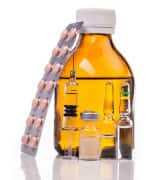Life Extension Magazine®

The bacteria-killing effects of penicillin were published in the British Journal of Experimental Pathology in 1929.1 The public did not gain access to penicillin until 1945.2,3 Millions of Americans died during the 16-year delay in making penicillin widely available.4-6 The same scenario is happening today. Effective ways to counteract aging have been discovered, but are overlooked by the medical mainstream.
Halt Alzheimer’s Dementia
Medical textbooks describe Alzheimer’s disease as progressive mental deterioration that is irreversible.7
This concept was turned upside down in 2014 as published human research showed progression of Alzheimer’s dementia can be partially reversed.8,9 The challenge in regressing Alzheimer’s is that it required strict adherence to dietary changes that most people are unable to comply with.
In a major advance, two low-cost natural compounds have been shown to halt Alzheimer’s progression. They work by protecting against the structural changes that occur in brain cells as we age.
In one human study, 54% of the Alzheimer’s patients given an extract from mother’s milk showed an average 25% improvement in mental test scores. The Alzheimer’s patients in the placebo arm of the study suffered a worsening of their neurologic status.10
Another study found no progression of symptoms in Alzheimer’s patients taking microdose lithium.11
Protection Against Cellular Aging
Microdose lithium is a potential breakthrough in the control of Alzheimer’s. The mechanism by which it functions may represent a new paradigm in the prevention of brain cell aging in healthy individuals.
Lithium is a GSK-3 inhibitor.12,13 Based on a growing body of evidence, compounds that inhibit the deadly GSK-3 enzyme may soon become as well-known as antioxidants are today.14-16
Unlike victims of bacterial infections who had no access to penicillin at any price, the cost of lithium is remarkably low.
Example of Lethal Delay
 |
- Alexander Fleming identified antibiotic properties of penicillin in 1928.17,18
- British Journal of Experimental Pathology published findings in 1929.
- Penicillin not widely available until 1945.2,3
- Delay caused millions of deaths.
Accelerated Development of Age-Delaying Compounds
The first article in this issue describes how lithium and a mother’s milk extract protect against the structure damage observed in Alzheimer’s patients.
These findings may seem at first to be of interest to those with dementia. The take-home lesson is that consumers can now afford to apply this novel protection against brain aging before cognitive impairment and other degenerative changes manifest.
Snail’s Pace
 |
| 1929 | Penicillin discovery published. |
| 1940 | Researchers pick up Fleming’s work.19 |
| 1942 | Enough penicillin produced to treat 10 people.20,21 |
| 1944 | 2.3 million doses of penicillin produced.20 |
| 1945 | Widespread availability to civilians.3 |
- It took World War II to create the sense of urgency to move penicillin research forward.
- Technologies to control pathological aging exist today, but are sadly overlooked by conventional medicine.
- Health-conscious consumers should stay informed and manage as much of their personal biology as possible.
Novel Method to Defend Your Joint Cartilage
The hallmark structural damage associated with osteoarthritis is degeneration of joint cartilage.
A fascinating article in this issue describes herbal extracts that were compared directly with popular arthritis drugs. Not only did these nutrients provide superior overall relief, but two of them demonstrated a slowing of cartilage degeneration, something the drugs did not do.
Relief for Sensitive Stomachs
Digestive difficulties remain a frequent cause of age-related discomfort. A common culprit is the H. pylori bacteria that can usually be eradicated by aggressive antibiotic intervention.
Japanese researchers have identified two nutrients that, when compounded together, safely reduce gastric inflammation, heal the stomach lining and reduce the presence of new H. pylori.
Annual Super Sale Savings!
Just once a year, we discount the price of ALL of our advanced formulas.
This enables consumers to obtain the latest versions of our premium nutrient blends at the lowest prices.
This is our 28th annual Super Sale. It begins November 14, 2016, and extends to January 31, 2017.
With the Rewards Dollars loyalty program, the savings are even greater.
To order the nutrients you need to preserve your health today, call 1-800-544-4440 (24 hours) or log on to LifeExtension.com
For longer life,
William Faloon, Co-Founder
Life Extension Buyers Club
References
- Fleming A. On the Antibacterial Action of Cultures of a Penicillium, with Special Reference to their Use in the Isolation of B. influenzæ. Bri J Exp Pathol. 1929;10(3):226-36.
- Available at: http://www.ox.ac.uk/news/science-blog/75-years-penicillin-people#. Accessed July 28, 2016.
- Available at: http://www.rsc.org/chemistryworld/node/3280. Accessed July 28, 2016.
- Available at: https://www.cdc.gov/nchs/data/dvs/lead1900_98.pdf. Accessed July 28, 2016.
- Fair RJ, Tor Y. Antibiotics and Bacterial Resistance in the 21st Century. Perspec Medicin Chem. 2014;6:25-64.
- Guyer B, Freedman MA, Strobino DM, et al. Annual summary of vital statistics: trends in the health of Americans during the 20th century. Pediatrics. 2000;106(6):1307-17.
- Available at: http://www.ncbi.nlm.nih.gov/pubmed/. Accessed July 28, 2016.
- Bredesen DE. Reversal of cognitive decline: a novel therapeutic program. Aging (Albany NY). 2014;6(9):707-17.
- Bredesen DE, Amos EC, Canick J, et al. Reversal of cognitive decline in Alzheimer’s disease. Aging (Albany NY). 2016;8(6):1250-8.
- Leszek J, Inglot AD, Janusz M, et al. Colostrinin: a proline-rich polypeptide (PRP) complex isolated from ovine colostrum for treatment of Alzheimer’s disease. A double-blind, placebo-controlled study. Arch Immunol Ther Exp (Warsz). 1999;47(6):377-85.
- Nunes MA, Viel TA, Buck HS. Microdose lithium treatment stabilized cognitive impairment in patients with Alzheimer’s disease. Curr Alzheimer Res. 2013;10(1):104-7.
- Orellana AMM, Vasconcelos AR, Leite JA, et al. Age-related neuroinflammation and changes in AKT-GSK-3 and WNT/ -CATENIN signaling in rat hippocampus. Aging (Albany NY). 2015;7(12):1094-108.
- Freland L, Beaulieu JM. Inhibition of GSK3 by lithium, from single molecules to signaling networks. Front Mol Neurosci. 2012;5:14.
- Jope RS. Lithium and GSK-3: one inhibitor, two inhibitory actions, multiple outcomes. Trends Pharmacol Sci. 2003;24(9):441-3.
- Zhou J, Force T. Focusing the spotlight on GSK-3 in aging. Aging (Albany NY). 2013;5(6):388-9.
- Eldar-Finkelman H, Martinez A. GSK-3 Inhibitors: Preclinical and Clinical Focus on CNS. Front Mol Neurosci. 2011;4:32.
- Ougolkov AV, Billadeau DD. Inhibition of glycogen synthase kinase-3. Methods Mol Biol. 2008;468:67-75.
- Ligon BL. Penicillin: its discovery and early development. Semin Pediatr Infect Dis. 2004;15(1):52-7.
- Diggins FW. The discovery of penicillin: so many get it wrong. Biologist (London). 2000;47(3):115-9.
- Tan SY, Tatsumura Y. Alexander Fleming (1881–1955): Discoverer of penicillin. Singapore Med J. 2015;56(7):366-7.
- Available at: http://www.gutenberg.us/article/whebn0000023312/penicillin. Accessed July 28, 2016.
- Available at: https://www.acs.org/content/acs/en/education/ whatischemistry/landmarks/flemingpenicillin.html. Accessed July 28, 2016.

